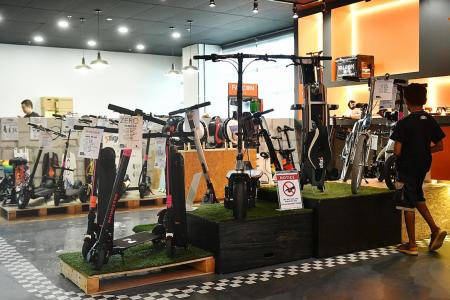New laws throttle back PMD sales
Retailers report up to 40 per cent drop in sales while PMD users rush to modify devices to comply with various restrictions
Buyers are holding back on purchasing personal mobility devices (PMDs) such as e-scooters after laws governing their use kicked in on May 1.
Retailers whom The Straits Times spoke to say sales have tumbled, adding that people need to become familiarised with the new regulations.
Under the Active Mobility Act, PMDs must abide by weight, width and speed restrictions.
Non-compliant ones can be seized by the Land Transport Authority, while users face a fine of up to $5,000, up to three months in jail, or both.
Mobot's general manager Chew Boon Hur said overall sales of PMDs have dropped by about 40 per cent since May 1.
"Many would-be customers may have been frightened off due to the recent news regarding the confiscation of e-scooters. Perhaps some who were considering getting a PMD are still unsure about the exact details within the Act and have held back," added Mr Chew.
Mr Jeremy Loh, manager of PassionGadgets, estimated that e-scooter sales have fallen by 20 per cent to 30 per cent.
At Falcon PEV, its general manager Victor Lee said PMD sales have slowed by about 20 per cent, starting from a year ago. He attributed this partly to more retailers entering the market, along with news of the new laws going into force.
An e-scooter retailer in the Ubi area, who declined to be named, said customers are also holding back because of an e-scooter registration regime taking effect in the second half of the year.
This will require users to provide their personal particulars and paste identification stickers on their e-scooters.
"Many customers are asking us how much the registration will cost and what the process will be. These details have yet to be announced," said the shop's sales assistant.
Some e-scooter owners are rushing to sell their devices or modify them, say retailers.
Falcon PEV's Mr Lee said his firm has been getting two to three calls a day from people looking to trade in non-compliant e-scooters for approved ones, or get their devices tuned so speeds are capped at the approved 25kmh limit.
PassionGadgets' Mr Loh said some 20 e-scooter owners have brought in their devices for compliance modifications. This includes switching to lighter tyres and batteries with a smaller capacity to meet the weight limit.
Under the Act, PMDs must be no heavier than 20kg. They also cannot be wider than 700mm.
"Customers now have to keep additional accessories to a minimum in order to be compliant," said Mr Chew of Mobot, referring to items such as child seats.
"This causes inconvenience to buyers who hoped to get a PMD so they can ferry their children to school, due to the additional weight of a child seat."
Those who need to travel long distances may not buy a PMD as bigger batteries will add weight and make the device non-compliant, he said.
The owner of a non-compliant e-scooter who wanted to be known only as Mr Yeo called the new regulations unfair.
"I bought my e-scooter two years ago, before the laws were enacted. I paid $1,200 for it. It is the younger riders who are reckless, not the older folk like us who ride slowly," the 67-year-old said in Mandarin.
"They should not seize my e-scooter just because it is heavier."
Get The New Paper on your phone with the free TNP app. Download from the Apple App Store or Google Play Store now



